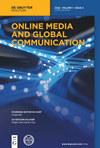The mediating role of comments’ credibility in influencing cancer cure misperceptions and social sharing
引用次数: 1
Abstract
Abstract Purpose The rise of fake news is an increasing issue for cancer patients. Specifically, the use of cannabis as a cure for cancer is the most shared social media content regarding alternative cancer treatments (Shi, Siyu, Arthur R. Brant, Aaron Sabolch & Erqi Pollom. 2019. False news of a cannabis cancer cure. Cureus 11(1). e3918. DOI:10.7759/cureus.3918). To better understand the relationship between fake news, perceived credibility, social sharing, and belief in health misinformation, we conducted an online experiment in the United States to explore how people react to fake cancer news on Facebook. Design/methodology/approach A four-condition between-subjects online experiment was conducted to examine whether the perceived credibility of information and comments serve as mediating factors to influence misperceptions and social sharing of cancer misinformation. Findings We find that it is the comments’ credibility rather than information credibility that acts as a mediator between the effects of exposure to variations of comments on cancer treatment misperceptions and social sharing intentions. Practical implications Our study provides important insights into correcting health misinformation on social media. Findings demonstrate the importance of healthcare professionals and organizations engaging with misleading and potentially harmful misinformation posted. Additionally, practitioners need to provide training to enhance individuals’ media literacy to better discern credible health information from misinformation on social media. Value The study advances prior misinformation correction and credibility literature. Theoretically, we find that perceived comments’ credibility act as a mediator in mitigating the spread of fake news. Furthermore, exposure to variations of corrective comments (vs. peers’ supportive comments) increased cancer cure misperceptions via comments’ credibility, a backfire effect indicating that cancer cure misperceptions persisted, were complicated, and difficult to correct.评论可信度在影响癌症治疗误解和社会分享中的中介作用
摘要目的假新闻的兴起对癌症患者来说是一个日益严重的问题。具体而言,使用大麻治疗癌症是关于癌症替代治疗的最受分享的社交媒体内容(Shi,Siyu,Arthur R.Brant,Aaron Sabolch&Erqi Pollom.2019)。大麻癌症治愈的假消息。Cureus 11(1)。e3918.DOI:10.7759/cureus.3918)。为了更好地理解假新闻、感知可信度、社交分享和对健康错误信息的信念之间的关系,我们在美国进行了一项在线实验,以探索人们对Facebook上的假癌症新闻的反应。设计/方法论/方法一项四条件受试者之间的在线实验旨在检验信息和评论的感知可信度是否是影响癌症错误信息的误解和社会共享的中介因素。研究结果我们发现,在癌症治疗误解和社会共享意图的不同评论的影响之间,是评论的可信度而不是信息可信度。实际意义我们的研究为纠正社交媒体上的健康错误信息提供了重要见解。研究结果表明,医疗保健专业人员和组织参与发布的误导性和潜在有害的错误信息的重要性。此外,从业者需要提供培训,以提高个人的媒体素养,从而更好地从社交媒体上的错误信息中辨别可信的健康信息。价值该研究推进了先前的错误信息更正和可信度文献。理论上,我们发现感知评论的可信度在缓解假新闻传播方面起到了中介作用。此外,暴露于不同的纠正意见(与同行的支持性意见相比)通过评论的可信度增加了癌症治愈误解,这是一种适得其反的效果,表明癌症治愈误解持续存在、复杂且难以纠正。
本文章由计算机程序翻译,如有差异,请以英文原文为准。
求助全文
约1分钟内获得全文
求助全文
来源期刊

Online Media and Global Communication
Communication, Media Studies, Internet Studies, International Studies, International Relations-
自引率
0.00%
发文量
0
期刊介绍:
Online Media and Global Communication (OMGC) is a new venue for high quality articles on theories and methods about the role of online media in global communication. This journal is sponsored by the Center for Global Public Opinion Research of China and School of Journalism and Communication, Shanghai International Studies University, China. It is published solely online in English. The journal aims to serve as an academic bridge in the research of online media and global communication between the dominating English-speaking world and the non-English speaking world that has remained mostly invisible due to language barriers. Through its structured abstracts for all research articles and uniform keyword system in the United Nations’ official six languages plus Japanese and German (Arabic, Chinese, English, French, Russian, Spanish, Japanese, and German), the journal provides a highly accessible platform to users worldwide. Its unique dual track single-blind and double-blind review system facilitates manuscript reviews with different levels of author identities. OMGC publishes review essays on the state-of-the-art in online media and global communication research in different countries and regions, original research papers on topics related online media and global communication and translated articles from non-English speaking Global South. It strives to be a leading platform for scientific exchange in online media and global communication.
For events and more, consider following us on Twitter at https://twitter.com/OMGCJOURNAL.
Topics
OMGC publishes high quality, innovative and original research on global communication especially in the use of global online media platforms such as Facebook, TikTok, YouTube, Twitter, Instagram, WhatsApp, Weibo, WeChat, Wikipedia, web sites, blogs, etc. This journal will address the contemporary concerns about the effects and operations of global digital media platforms on international relations, international public opinion, fake news and propaganda dissemination, diaspora communication, consumer behavior as well as the balance of voices in the world. Comparative research across countries are particularly welcome. Empirical research is preferred over conceptual papers.
Article Formats
In addition to the standard research article format, the Journal includes the following formats:
● One translation paper selected from Non-English Journals that with high quality as “Gems from the Global South” per issue
● One review essay on current state of research in online media and global communication in a country or region
 求助内容:
求助内容: 应助结果提醒方式:
应助结果提醒方式:


